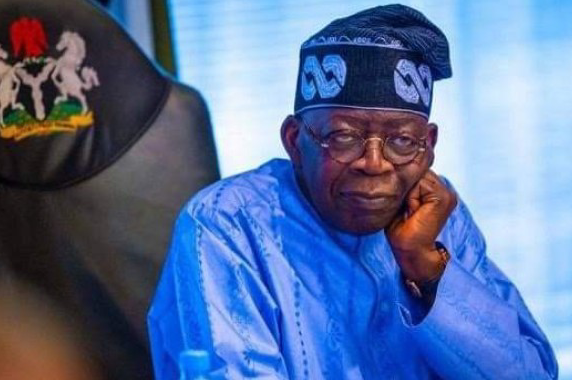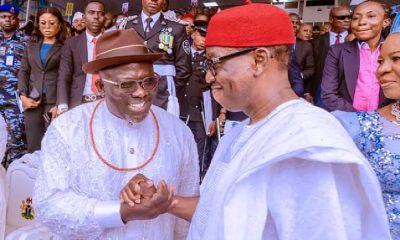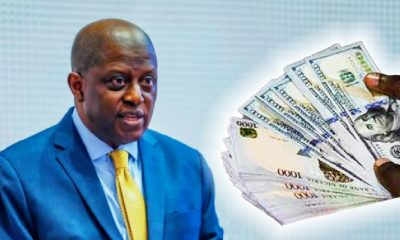Opinion
MUSINGS ON THE “RENEWED HOPE” AGENDA CABINET

BY BOLAJI AFOLABI
For many football loving Nigerians, commencement of the 2024/25 league season across Europe was a welcoming break from the recurring palpitations occasioned by multi-dimensional and multi-sectoral challenges pervading national space. Given the ecstasy and excitement it provides, spectators and fans are very hopeful that for about 40 weekends, something cheering would occupy their minds; away from the ever-increasing national problems. Back in the ’80s, *INDEEP* , was a New York-based musical group that released ‘ *when boys talk’* after it’s hugely successful ‘ *last night a DJ saved my life* .’ A line in the former that, ‘ *boys* *talk politics* …’ came to mind after the Liverpool versus Ipswich Town English Premier League opener few weeks back.
Over an hour of chit chat which included analysis, opinions, arguments, and more; a regular fixture at most viewing centres the topic of discourse veered into politics. From national to states and party politics, it was a robust and enlightening exchange between and among all. To add colour, panache, and rib-cracking to the scenario, the writer threw a puzzle; asking the name of the person who superintendents a particular ministry. For over thirty minutes, the gathering became a mini “who wants to be a millionaire” show. Responses were funny, cynical, and befuddling. At the end, many got it wrong, no where near the actual answer.
Buoyed by this disturbing discovery, the writer did random survey asking name(s) of ministers from people. The results were thought provoking, challenging and revealing. Names of few ministers are readily called. Somehow, the ‘playful’ exercise brought concerns to the writer. That people cannot readily recall names of their respective state’s representative on the cabinet list was shocking. That many had to resort to Google for “escape route” was saddening. That educated elites flunked the poser gives worrying signs.
August last year, when President Bola Tinubu sworn in his 46-member cabinet team after successful screening and confirmation by the Senate, there were varied opinions. While some people criticized the number arguing that it would stifle the economy, others believed it was the right way to go considering urgent need for pragmatic development. A school of thought postulated that aside being the largest ministerial cabinet since 1999, the names do not evoke confidence and believability. Another school countered that with the injection of achievers in the private sector, and creation of new ministries, Tinubu’s cabinet should perform. Yet, a different group inferred that with the creation of new ministries including Creative Economy; and re-modelling of few such as Health and Social Welfare; Agriculture and Food Security; Water Resources and Sanitation the cabinet was primed to deliver.
After one year in their various capacities as ministers, just as it was during composition, opinions and views of Nigerians are divided about their performances. There has been wide-ranging comments and criticisms about the cabinet. From reports, it has been deluge of condemnation and few commendation. What about consistent talks of large numbers; wrong deployments; lack of understanding of briefs; and more? For many people, the ministerial team has not lived to the expectations of Nigerians. Some opined that they have not justified the confidence reposed in them by Tinubu.
By their actions, inactions, and activities one can categorize the cabinet in five groups. There are the performers; those showing promises; those who flatter; those missing in action; and outright failures. Some merely make ‘politically correct’ statements with less or no corresponding action. Sadly, there are those who have taken, and maintained sleeping-modes. Some do not have any concrete and ‘see-able’ programme. Some have been innocuously silent, absent, and forgotten by Nigerians. Some have performed abysmally low in spite their initial boastful, and pretentious posturing.
Though there has been near-unanimity of opinion about the whimsical and undulating performances of the ministers, it is not all gloom and moody. Given the aggregation of views and opinions by people, there are few bright lights that evokes inspiration and confidence. In the midst of the class of largely non-ingenious, somewhat confused, overwhelmed, and disappointing failures, few have earned the applause and encomium of Nigerians. To reasonable extent, they have added depth and deliveries to the Tinubu administration. A bird’s eye review of these ministers; in no ranking order will suffice.
Nyesom Wike as the 17th minister of the federal capital territory is a paradox. To some, he is controversial and aggressive. Many others love his direct, frank, and open style of administration. Like or loathe him, vast majority of Abuja residents, and regular visitors commend his business-like approach to the delivery of outstanding projects and programmes spread in and around Nigeria’s capital. Under his watch, in addition to massive infrastructural development geared towards transforming Abuja, he has increased revenue generation to about 126.54 billion naira in the first 6 months of 2024, which is 53.5 percent higher than the figure in 2023. Public service reforms leading to establishment of FCT Civil Service Commission; appointments of Head of Service, and a dozen Permanent Secretaries; creation of Women Affairs, and Youth Development Secretariats. Extension of development to Area Councils to open up, and boost rural economy. Impressed by his excellent work rate and visible achievements, many describe him as the ‘poster boy’ of Tinubu’s government.
One can conclude that the Interior Minister, Olubunmi Tunji Ojo has shown passion, dedication, commitment in his tour of duty. The 42-year old Ondo state-born former lawmaker has displayed ingenuity and fervour in piloting the ministry. With the rare combination of brilliance, education, exposure, and experience, he has recorded achievements. These includes innovative templates for passport processing; clearance of over 200,000 passport backlogs in just 3 weeks. Facilitated the release of over 4,000 prison inmates; payment of outstanding allowances, and improvement of existing welfare structures of agencies; rehabilitation and upgrade of facilities. Cleared over 10 billion naira debts, owed by his predecessors in his first few months; procurement of patrol vehicles, and other necessary operational components for surveillance activities.
Doris Nkiruka Uzoka-Anite, the medical doctor turned banker and financial investment expert superintendents the nation’s industry, trade, investment ministry. Though she oversee a largely unknown but critical sector, she has made encouraging achievements which is expected to manifest from the third quarter of 2025. These includes $30 billion investment commitments by some international companies and agencies; $14 billion worth of FDI inflow; $10 billion offshore investments commitment in Nigeria’s oil and gas free zones. Secured $3 billion facility from AFREXIM to build an industrial park, and light manufacturing expected to generate about 20,000 jobs; over $2 billion partnership with an African Finance Corporation subsidiary to resuscitate the cotton and textile industries for massive economic boost, and job creation. Arguably, the best in the ministry since 1999, she needs to improve her public affairs management.
Under the pragmatic leadership of Engr. Dave Umahi, the Works ministry is being positioned to effectively and efficiently meet the expectations of Nigerians.The Abuja-Kano, Port Harcourt-Enugu expressways, and other federal roads critical to national development are receiving positive look-in. It is expected that Umahi will galvanise the FERMA to fix bad patches of roads across the country. The Aviation and Aerospace Development Ministry has posted some encouraging feats. Under the leadership of Festus Keyamo, the ministry facilitated Air Peace’s Lagos-London route; the US-Nigeria Open Skies Air Transport Agreement which is expected to enable local airlines operate more freely on this routes; resolution of trapped funds for foreign airlines; resolution of the Nigeria/Emirates Airline crisis, and few other initiatives.
Few other ministers overseeing justice; solid minerals; housing and urban development; finance and budget; health and social welfare; digital economy merits measured commendation. Can one say same about their colleagues in defence; education; environment; tourism; science and technology; creative economy; blue economy; agriculture and food security; steel development; water resources and sanitation; and niger delta affairs? Indeed, their respective contributions to the renewed hope agenda requires robust public scrutiny and citizenry inquisition.
Having grossed one year as cabinet ministers, the searchlight has been on them. There has been repeated calls for total overhaul of the team. Some believe that the non-performance of many ministers has led to preponderance of socio-economic challenges. Pushing further, some argue that Nigerians are wallowing in pervasive poverty, escalating inflation, and gradual moral depravity due to the glaring disconnect between government and citizens. There is the general believe that re-jigging the cabinet is most ideal. Tinubu’s ministers should count themselves lucky for being chosen among 200 million Nigerians. A Yoruba proverb that you can facilitate employment for someone but you can’t do the job is most appropriate at this time. Tinubu should do the needful by embarking upon major surgery on his cabinet; to increase citizens believe, re-focus government, and ensure immediate service delivery. Capacity, competence, experience, and relevance should form the criterion for emplacing the proposed cabinet makeover.
* *BOLAJI AFOLABI, a development communications specialist was with the Office of Public Affairs in The Presidency*
Opinion
CBN under Cardoso and $6.83 Billion balance of payments surplus in 2024 that signals economic resurgence

By Ibrahim Modibbo
Since his appointment as the Governor of the Central Bank of Nigeria, in October 5, 2023, Olayemi Cardoso has continue to bring on board wide-range of macroeconomic reforms, stronger trade performance, and renewed investor confidence in Nigeria’s economy, that were aimed at putting the country back to its economic footing, as a strong economy that is second to none in Africa.
As part of the ongoing reforms, the Central Bank of Nigeria recently announced a Balance of Payments (BOP) surplus of $6.83 billion for the 2024 financial year, marking a decisive turnaround from deficits of $3.34 billion in 2023 and $3.32 billion in 2022, according to a press statement from Mrs Sidi-Ali, Hakama, the Ag. Director, Corporate Communications of the apex bank.
CBN says “the current and capital account recorded a surplus of $17.22 billion in 2024, underpinned by a goods trade surplus of $13.17 billion. Petroleum imports declined by 23.2% to $14.06 billion, while non-oil imports fell by 12.6% to $25.74 billion. On the export side, gas exports rose by 48.3% to $8.66 billion, and non-oil exports increased by 24.6% to $7.46 billion.”
While “remittance inflows remained resilient, with personal remittances rising by 8.9% to $20.93 billion. International Money Transfer Operator (IMTO) inflows surged by 43.5% to $4.73 billion, up from $3.30 billion in 2023, reflecting stronger engagement from the Nigerian diaspora. Official development assistance also rose by 6.2% to $3.37 billion,” the statement added.
Nigeria recorded a net acquisition of financial assets totalling $12.12 billion. Portfolio Investment inflows more than doubled, increasing by 106.5% to $13.35 billion, while resident foreign currency holdings grew by $5.41 billion, indicating stronger confidence in domestic economic stability. Although foreign direct investment fell by 42.3% to $1.08 billion, the overall financial account posted notable gains.
The country’s external reserves increased by $6.0 billion to $40.19 billion by year-end 2024, bolstering its external buffer.
Notably, net errors and omissions narrowed significantly by 79.5% to negative $5.10 billion in 2024, down from $24.90 billion in 2023, reflecting substantial improvements in data availability and capture. This represents a major advance in data accuracy, transparency, and overall reporting integrity.
The 2024 BOP surplus highlights the effectiveness of Nigeria’s ongoing reform agenda. The liberalisation and unification of the foreign exchange market, a disciplined monetary policy approach to managing inflation and stabilising the naira, and coordinated fiscal and monetary measures have all contributed to enhanced competitiveness and investor sentiment.
“The positive turnaround in our external finances is evidence of effective policy implementation and our unwavering commitment to macroeconomic stability,” said the Governor of the Central Bank of Nigeria. “This surplus marks an important step forward for Nigeria’s economy, benefiting investors, businesses, and everyday Nigerians alike,” the statement further noted.
Other notable indicators to building strong economy by this policy include but not limited to a stronger trade performance, particularly in the current and capital accounts, with a surplus of $17.22 billion in 2024, has contributed to the balance of payments surplus. A goods trade surplus of $13.17 billion that will further strengthens the positive trend. The decline in petroleum and non-oil imports also contributes to a more favorable trade balance.
It will noteworthy to note that the CBN’s reforms have increased investor confidence, leading to higher foreign portfolio investment inflows. Portfolio investment inflows more than doubled in 2024, reaching $13.35 billion. This influx of capital indicates a stronger belief in the stability and growth prospects of the Nigerian economy.
The apex bank’s disciplined monetary policy and FX market reforms on the other hand are aimed at managing inflation and stabilizing the Naira, has contributed to a more stable financial system.
The liberalization and unification of the foreign exchange market have led to greater transparency and reduced distortions in the market.
The implementation of an Electronic Foreign Exchange Matching System (EFEMS) further enhances transparency and efficiency in the FX market.
The reforms, including the unification of the exchange rate, have improved Nigeria’s competitiveness and attracted more foreign investment. Testament to this is the clearing of a $7 billion forex backlog which has also boosted the country’s image with foreign investors.
Also, the significant improvements in data availability and capture have led to a marked reduction in net errors and omissions in the balance of payments data. This enhanced data integrity provides a more accurate picture of the country’s economic performance and builds trust with stakeholders.
In conclusion, the combination of strong trade performance, renewed investor confidence, disciplined monetary policy, and improved data integrity, all facilitated by the CBN’s wide-ranging reforms, are key indicators of Nigeria’s economic resurgence. These developments demonstrate the positive impact of the reforms on the nation’s external finances and overall economic stability.
Dr Moddibo, a public analyst, wrote in from Abuja
Opinion
CBN leads financial dialogue with JP Morgan, NGX, others, in pre-spring meetings Forum

By Dr. Ibrahim Modibbo
In anticipation of the International Monetary Fund (IMF) and World Bank Group (WBG) Spring meetings which commenced on Monday, April 21, 2025, the Central Bank of Nigeria (CBN) partnered with J.P. Morgan, the Nigerian Exchange Group (NGX) and Africa Private Capital Association (AVCA) to host a high-profile global forum at Nasdaq MarketSite in New York on Thursday, April 17, 2025, according to press statement by Dr Ibrahim Moddibo.
The forum, titled “The Nigeria Investment Agenda: Pathways for Growth & Global Partnerships,” convened global investors, diaspora leaders, and senior financial stakeholders to examine Nigeria’s macroeconomic prospects and ongoing reform progress.During his commanding address, Governor Olayemi Cardoso outlined his comprehensive reform strategy encompassing monetary tightening, foreign exchange market transparency, and enhanced financial governance.
He emphasized that these initiatives are establishing the foundation for sustainable macroeconomic stability and heralding a new era of transparency and confidence.Governor Cardoso reaffirmed the CBN’s unwavering commitment to rebuilding credibility through orthodox monetary policy, transparency, and consistency.
“We inherited a crisis of confidence but chose a different path. We’re not turning back,” he stated decisively.In a powerful fireside chat between the Governor and Nobel Prize-winning economist Dr. James Robinson, Reverend Richard L. Pearson Professor at the University of Chicago, Governor Cardoso elaborated on his vision to reestablish the CBN as a credible, trusted institution – rooted in domestic excellence and respected internationally.Mr. Muhammad Sani Abdullahi, Deputy Governor for Economic Policy at the CBN, delivered a macroeconomic update highlighting sharp increases in foreign exchange turnover, emerging signs of disinflation, and strengthening external reserves. “With a market-determined exchange rate and a transparent, rules-based policy framework, confidence is gradually being restored in Nigeria’s economy,” he noted.
Welcoming participants to the forum, Dr. Nkiru Balonwu, Adviser to the CBN Governor on Stakeholder Engagement and Strategic Communication, framed the forum as a key moment in the Bank’s broader engagement strategy. “Today is more than a conversation,” she noted.
It’s about opening the books on the CBN’s transformation story under Governor Cardoso – sharing the facts, interrogating the progress, and looking ahead together at what more can be done to build sustainable partnerships and unlock long-term capital,” she explained.
Another key highlight of the event was the panel discussion entitled “Repricing Nigeria: Assessing the Scope for Sustained Change.” Moderated by Gavin Serkin, Founder of New Markets Media & Intelligence, the panel featured global financial luminaries: Joyce Chang, Chair of Global Research at JPMorgan Chase; Jason Rekate, Global Co-Head of Corporate Banking at Citi; Razia Khan, Chief Economist for Africa & Middle East at Standard Chartered; and Ahmad Zuaiter, Co-Founder & CIO of Jadara Capital Partners. Each panelist provided expert perspectives on Nigeria’s investment landscape, noting renewed international interest driven by improved fundamentals, strengthened governance, and clearer policy direction.
The CBN Board and Monetary Policy Committee were represented by US-based diaspora members Mr. Robert Agbede, Prof. Melvin Ayogu, and Dr. Aloysius Ordu, underscoring the Bank’s global engagement and commitment to leveraging Nigerian talent worldwide. Temi Popoola, Group CEO of NGX, moderated the Q&A session, while Dr. Olubukola Akinniyi Akinwunmi, Director of Banking Supervision at CBN, delivered the closing remarks.The forum focused on substantive discussions and future prospects: engaging critical voices, evaluating progress, and identifying requirements for building lasting partnerships and attracting long-term capital. Central to this endeavor is a clear objective: reestablishing the CBN as a credible, trusted institution respected globally and dedicated to excellence at home.
Dr. Ibrahim Modibbo, a public affairs analyst writes from Abuja.
Opinion
Instagram , WhatsApp troubled by antitrust laws

By Sonny Aragba-Akpore
While we are yet to grapple with the fate of Tik Tok which President Donald Trump had asked its parent company Byte Dance of China to divest from it’s American operations or be banned, Meta Group, owners of Instagram and WhatsApp, is troubled over antitrust concerns.
The U.S. Federal Trade Commission (FTC) has taken the group to court over anti competition issues.
Specifically, the FTC wants Meta to divest from its two biggest companies in an antitrust trial that could redefine the future of social media.
And so Meta’s world is troubled as Mark Zuckerberg’s company could be forced to sell Instagram and WhatsApp if it loses the lawsuit that has just begun in the U.S.
The FTC has accused Zuckerberg’s company of having bought both platforms to eliminate competition and maintain a monopoly on social media.
If the court rules against them, it would be a historic blow to the tech giant.
Zuckerberg acquired Instagram in 2012, and then, two years later,(2014) completed his trio by buying WhatsApp.
Facebook is the third leg of the trio and this easily makes the group the largest tech owner in the world.
Although these acquisitions were approved by the FTC itself at that time ,but now this lawsuit seeks to reverse that approval, arguing that the purchase was not for innovation but to “neutralize” emerging rivals like Instagram which was acquired in 2012 and thus take control of the entire market.
The FTC claims that Meta has used its financial muscle to block competition, buying up emerging apps instead of competing with them, and it has been doing this since 2008! Everything is based on 2012 emails where Zuckerberg had expressed concern about Instagram’s rapid growth compared to Facebook’s performance (which was his only app at the time). In those emails, Zuckerberg admitted it was better to buy than to compete. And so he did, acquiring the app years later.
“On the other hand, he also bought WhatsApp, and of course that reinforces the FTC’s accusation. Meta strengthened its control over the digital system, keeping these apps as separate platforms but under the same power structure” analysts reason.
Meta has not denied the purchases, even though it rejects having acted in an anti-competitive way, calling the case a “weak lawsuit that ignores reality,” since they believe they face strong competition from platforms like TikTok, YouTube or X among many other apps.
During the trial, Zuckerberg claimed he bought Instagram for its camera technology, not because the social network was on the rise, but the 2012 messages don’t seem to support that statement very well.
In the likelihood that FTC wins this case, Meta could be forced to sell Instagram, WhatsApp, or both. This wouldn’t necessarily mean an immediate change for users, but it would shift the balance in the digital market, according to experts.
Digital sociologists think that Meta would make it easier to regulate social networks individually by the FTC.
One of the major implications will be on things like content moderation, privacy, or the use of personal data.
“If it gets split, it would be easier for lawmakers, ensuring proper service to users” digital sociologists admit.
There are however fears of who buys if it gets to that .
For instance If a controversial figure like Elon Musk or an investment fund takes control of Instagram, like what happened with Twitter (now X), it’s possible that many users would leave in large numbers for new alternatives that may emerge, like BlueSky.
“But if it falls into the hands of a discreet company, without major visible changes, it’s likely that most people will keep using it as they always have.”
Although Meta does not reveal exactly how much it earns from each app, it is estimated that Instagram generates around $37 million a year, surpassing Facebook’s revenue according to analysts.
“So of course, Zuckerberg’s eagerness to get out of this case is clear: they can’t afford to lose that income because it would be a catastrophe for Meta” another analyst submits.
The expectations are dicey because the court’s decision will not only affect Meta, but could also open the door to more lawsuits against other big platforms for similar monopoly practices. And at a time when the control of social networks is more questioned than ever, this case could define the future of the digital system in terms of free choice and regulations.
Instagram and WhatsApp which were acquired over a decade ago have become social powerhouses and easily the biggest platforms in that genre.
This looming antitrust trial will be the first big test of President Trump’s Federal Trade Commission’s ability to challenge Big Tech.
The lawsuit was first filed against Meta — then called Facebook — in 2020, during Trump’s first term. It claims the company bought Instagram and WhatsApp to squash competition and establish an illegal monopoly in the social media market.
FTC contends that Meta has maintained a monopoly by pursuing CEO Zuckerberg’s strategy, “expressed in 2008: ‘It is better to buy than compete.’ True to that maxim, Facebook has systematically tracked potential rivals and acquired companies that it viewed as serious competitive threats.”
U.S. antitrust laws are enforced by both the FTC’s Bureau of Competition and the Antitrust Division of the Department of Justice. The agencies consult before opening any investigation. The Antitrust Division handles all criminal antitrust enforcement.
The FTC,s Bureau of Competition enforces the nation’s antitrust laws, which form the foundation of a free market economy.
The antitrust laws promote the interests of consumers; they support unfettered markets and result in lower prices and more choices.
The Federal Trade Commission Act and the Clayton Act, both passed by Congress in 1914, give the Commission authority to enforce the antitrust laws.
These laws prohibit anticompetitive mergers and business practices that seek to prevent hard-driving competition, such as monopolistic conduct, attempts to monopolize, and conspiracies in restraint of trade.
The Bureau of Competition investigates potential law violations and seeks legal remedies in federal court or before the FTC’s administrative law judges. The Bureau also serves as a resource for policy makers on competition issues, and works closely with foreign competition agencies to promote sound and consistent outcomes in the international arena.
WhatsApp (officially WhatsApp Messenger) is an American social media, instant messaging (IM), and voice-over-IP (VoIP) service owned by technology conglomerate Meta. It allows users to send text, voice messages and video messages, make voice and video calls, and share images, documents, user locations, and other content.
WhatsApp’s client application runs on mobile devices, and can be accessed from computers.
The service requires a cellular mobile telephone number to sign up.
In January 2018, WhatsApp released a standalone business app called WhatsApp Business which can communicate with the standard WhatsApp client.
The service was created by WhatsApp Inc. of Mountain View, California, which was acquired by Facebook in February 2014 for approximately US$19.3 billion.
It became the world’s most popular messaging application by 2015,and had more than two billion users worldwide by February 2020,confirmed four years later by 200 million new registrations per month.
By 2016, it had become the primary means of Internet communication in regions including the Americas, the Indian subcontinent, and large parts of Europe and Africa.
Instagram is an American photo and short-form video sharing social networking service owned by Meta Platforms. It allows users to upload media that can be edited with filters, be organized by hashtags, and be associated with a location via geographical tagging.
Posts can be shared publicly or with preapproved followers. Users can browse other users’ content by tags and locations, view trending content, like photos, and follow other users to add their content to a personal feed.
A Meta-operated image-centric social media platform, it is available on iOS, Android, Windows 10, and the web. Users can take photos and edit them using built-in filters and other tools, then share them on other social media platforms like Facebook.
It supports 32 languages including English, Hindi, Spanish, French, Korean, and Japanese.
Instagram was originally distinguished by allowing content to be framed only in a square aspect ratio of 640 pixels to match the display width of the iPhone at the time.
In 2015, this restriction was eased with an increase to 1080 pixels. It also added messaging features, the ability to include multiple images or videos in a single post, and a Stories feature—similar to its main competitor, Snapchat, which allowed users to post their content to a sequential feed, with each post accessible to others for 24 hours.
As of January 2019, Stories were used by 500 million people daily.
Instagram was launched for iOS in October 2010 by Kevin Systrom and Mike Krieger. It rapidly gained popularity, reaching one million registered users in two months, 10 million in a year, and one billion in June 2018.
In April 2012, Facebook acquired the service for approximately US$1 billion in cash and stock. The Android version of Instagram was released in April 2012, followed by a feature-limited desktop interface in November 2012, a Fire OS app in June 2014, and an app for Windows 10 in October 2016.
Although often admired for its success and influence, Instagram has also been criticized for negatively affecting teens’ mental health, its policy and interface changes, its alleged censorship, and illegal and inappropriate content uploaded by users.
-

 News23 hours ago
News23 hours agoINSECURITY! Enough is enough, Tinubu tells security chiefs, NSA
-

 News23 hours ago
News23 hours agoJust in: Air Peace suspends all scheduled flights nationwide
-

 News22 hours ago
News22 hours agoINEC moves to legalise voting without PVC
-

 Economy14 hours ago
Economy14 hours agoSEE current exchange rate of the Dollar to Naira
-

 News18 hours ago
News18 hours agoJust in: PDP can never die over gale of defection -Hon Teejay Yusuf insists
-

 Politics23 hours ago
Politics23 hours agoFCT minister, Wike, Uzodinma hail Okowa/Oborevwori defection to APC
-

 News11 hours ago
News11 hours agoJUST IN: Rivers Sole Administrator Ibas Shun Reps Panel
-

 Opinion20 hours ago
Opinion20 hours agoCBN under Cardoso and $6.83 Billion balance of payments surplus in 2024 that signals economic resurgence




